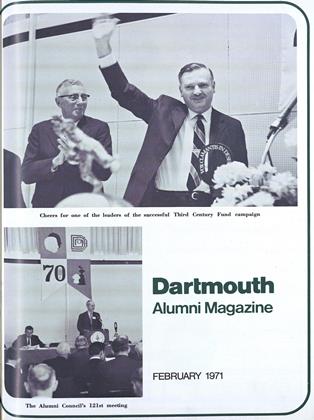By Lawrence E. Harvey (Dean of theDartmouth Faculty of Arts and Sciencesand Professor of Romance Languages andLiteratures). Princeton University Press,1970. 451 pp. $12.50.
Beckett is the foremost novelist and, when he chooses, the foremost dramatist of our time. In both roles he has been the subject, or victim, of innumerable academic discussions. The results are petrifying: the public Beckett is becoming, malgre lui, a monumental object of idolatry. But there's a private, human Beckett too, and he is still available to us.
Sometimes a master of art turns to an art of which he is not master when he wants to express his most personal or his merely personal self. Michelangelo turned to poetry; so does Beckett. His poems are clotted with outmoded stylistic highjinks, elliptical allusions, and unclarified personal references. They're not public property, like his other works, nor will they ever be. Yet Lawrence Harvey has spent thirteen years of arduous research, including extensive interviews with Beckett, in order to write this large and definitive study of those poems. It seems, at first, an oddly misdirected effort.
Yet it is not. For one thing, many of the poems are pleasing enough to requite elucidation. They offer a voice more emotional, more lyrical, than is easily found in the plays and fiction — coping with love, for instance, with "the churn of stale words in the heart again/love love love thud of the old plunger," a love that leaves the speaker terrified again of not loving of loving and not you of being loved and not by you of knowing not knowing pretending ... Facing love, in short, in all its repetitiveness, mutability, dubiousness, and uncontrollability: "I and all the others that will love you/ if they love you." In many of the poems, lyric feelings and moments are predictably undercut by Beckett's glum awareness of reality, as when a delightful bicycle ride — "all the livelong way this day of sweet showers/from Portrane on the seashore" — turns absurd as the speaker thinks of his unheroic self on the bicycle: pounding along in three ratios like a sonata like a Ritter with pommelled scrotum atra cura on the step Botticelli from the fork down pestling the transmission ...
The poems are worth attention in themselves. But because Dean Harvey has connected them so thoroughly with their biographical origins, and has collected so much obiter dicta from Beckett along the way, his book is valuable to all readers of Beckett, who emerges from it not petrified into a monument but revealed as the complex, troubled, thoroughly human victim of existence that he really is. Dean Harvey repeats none of the cliches and generalities of Beckett scholarship, and he treads warily .around such irrelevancies as symbolism and philosophy. His approach is as valuable for what it avoids as for what it does, and what it does is done very well.
Professor of English at the University ofConnecticut, Mr. O'Hara is Editor of Twentieth Century Interpretations of Molly, Malone Dies, The Unnamable: A Collection of Critical Essays, recently published byPrentice-Hall, Inc.
 View Full Issue
View Full Issue
More From This Issue
-
 Feature
FeatureTrustees and Alumni Council Hear 1970 Called "Great Year for Dartmouth"
February 1971 -
 Feature
FeatureThe Blackman Era: Sixteen Special Years
February 1971 By JACK DE GANGE -
 Feature
FeatureAlumni Council Nominates Three for College Trustees
February 1971 -
 Feature
FeatureAlumni Awards
February 1971 -
 Article
ArticleA Different View of Vietnam
February 1971 By STEPHEN HART '68 -
 Article
ArticleFaculty
February 1971 By WILLIAM R. MEYER










